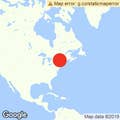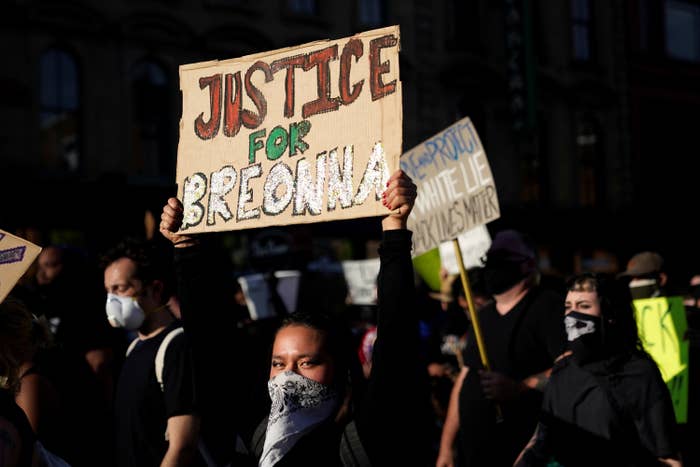
BROOKLYN — In the middle of a street in Greenpoint, Brooklyn, hundreds of people, mostly white, knelt silently and listened. In front of them stood Tenelle Veira, the protest’s organizer, wearing a white Black Lives Matter T-shirt and a black beret. She held a megaphone and faced the crowd, speaking quietly and calmly, so everyone had to lean in to listen.
“I want you all to imagine what it must have felt like to be sleeping in your bed,” the 29-year-old said, pausing for emphasis, “when three police officers kick down your door, waking you up and shooting you eight times.”
“I want you to stand up,” she said. The crowd stood up. “We have work to do.”
Veira’s protest — one of dozens that took place in New York City on Wednesday, and one of countless around the world — was in the name of justice for Breonna Taylor, an EMT and emergency room technician who was killed by police on March 13.
Taylor was asleep in bed with her boyfriend when three Louisville police officers in plain clothes took a battering ram to her door and killed her. They fired about 20 rounds, hitting Taylor at least eight times.
The police were investigating acquaintances of Taylor’s boyfriend who they believed were selling drugs. It’s unclear whether her boyfriend, Kenneth Walker, was involved. The police have said they fired their weapons only after Walker fired his, which Taylor’s family vehemently disputes, saying the couple thought they were experiencing a break-in. There’s no body camera footage of her killing.
She would have turned 27 on Friday.
It took two months for Taylor’s death to become a national news story, and that was only after Kentucky’s attorney general announced an investigation in May. That was days after a graphic video showed two white men killing Ahmaud Arbery in Georgia in February, and a week before police killed George Floyd in Minneapolis. Of these three highly publicized cases, the police who killed Taylor are the only ones not facing charges.
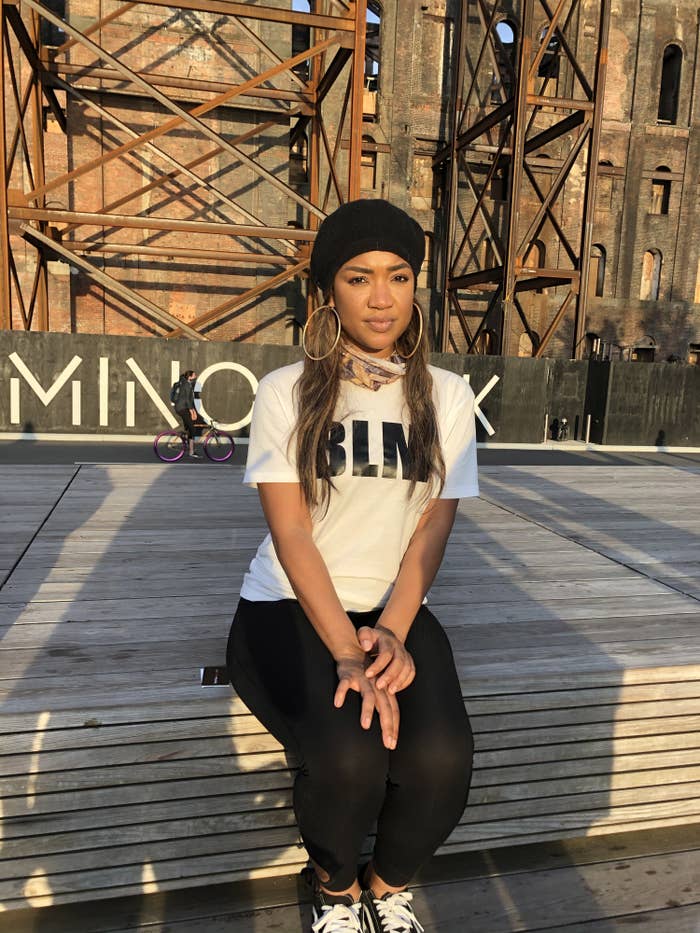
At the protest in Brooklyn, as thousands marched more than five miles up Bedford Avenue, the longest street in Brooklyn, Veira reminded everyone that the three officers who fired their weapons on Taylor still have their jobs at the Louisville Metro Police Department, and that the investigation into the incident is still ongoing nearly three months after Taylor’s death.
Taylor was killed during the height of fears over the coronavirus, and there was no video footage of the incident to rocket across social media, two factors that may have contributed to the delayed outrage over her death. Protesters who spoke to BuzzFeed News on Wednesday have another reason why Taylor’s case didn’t receive much attention: She’s a Black woman.
“I'm tired of Breonna's name being an afterthought,” Veira told the crowd as it paused for breath in Williamsburg. “I'm tired of hearing men's names and then Breonna's name. Give her the respect she deserves.”
This was the reason Veira organized the march, she told BuzzFeed News after the crowd had reached its destination and started to disperse to other protests or to make it home before Mayor Bill de Blasio’s 8 p.m. curfew. She cares deeply about Floyd and Arbery, she said, but Taylor deserves as much attention. A GoFundMe page created for Floyd’s family had raised $12.5 million by Thursday morning. Taylor’s had only raised $1.7 million. (In contrast, fundraisers for the funeral for Tony McDade, a Black transgender man killed by police last week in Tallahassee, Florida, has only raised $132,602.)
“It would have been an insult to Breonna Taylor and all the Black women and girls out there to stay home and pretend this isn’t happening,” Veira told the crowd.
Many people at Wednesday’s protest did not know it was specifically devoted to Taylor. Several people held signs referring to Floyd. Four people told BuzzFeed News that they were not aware of the protest’s purpose.
“I have been wanting to brief myself on the crimes that happened with Breonna Taylor,” Ghana Elshazz, a 38-year-old health and wellness student, told BuzzFeed News. She did not realize this was a march for Taylor specifically; she added that she believed that women were often “sidelined” during broader protests against police brutality.
Briana Barker and Patricia Bellegarde also didn’t realize that the protest was for Taylor until they joined the crowd in Brooklyn. Barker told BuzzFeed News she’s glad they showed up.
“We have to honor her life as well. Her life was taken unjustly as well,” Barker said.
Bellegarde said she’s fighting for herself and the children she’ll have in the future.
“A cop can go home and take off his clothes and be OK. I cannot take off my skin. I am Black regardless of where I go,” she said. “And not only am I Black, I am a Black woman. So if you’re already at a disadvantage for being a woman, and you’re already at a disadvantage for being Black, imagine being both.”
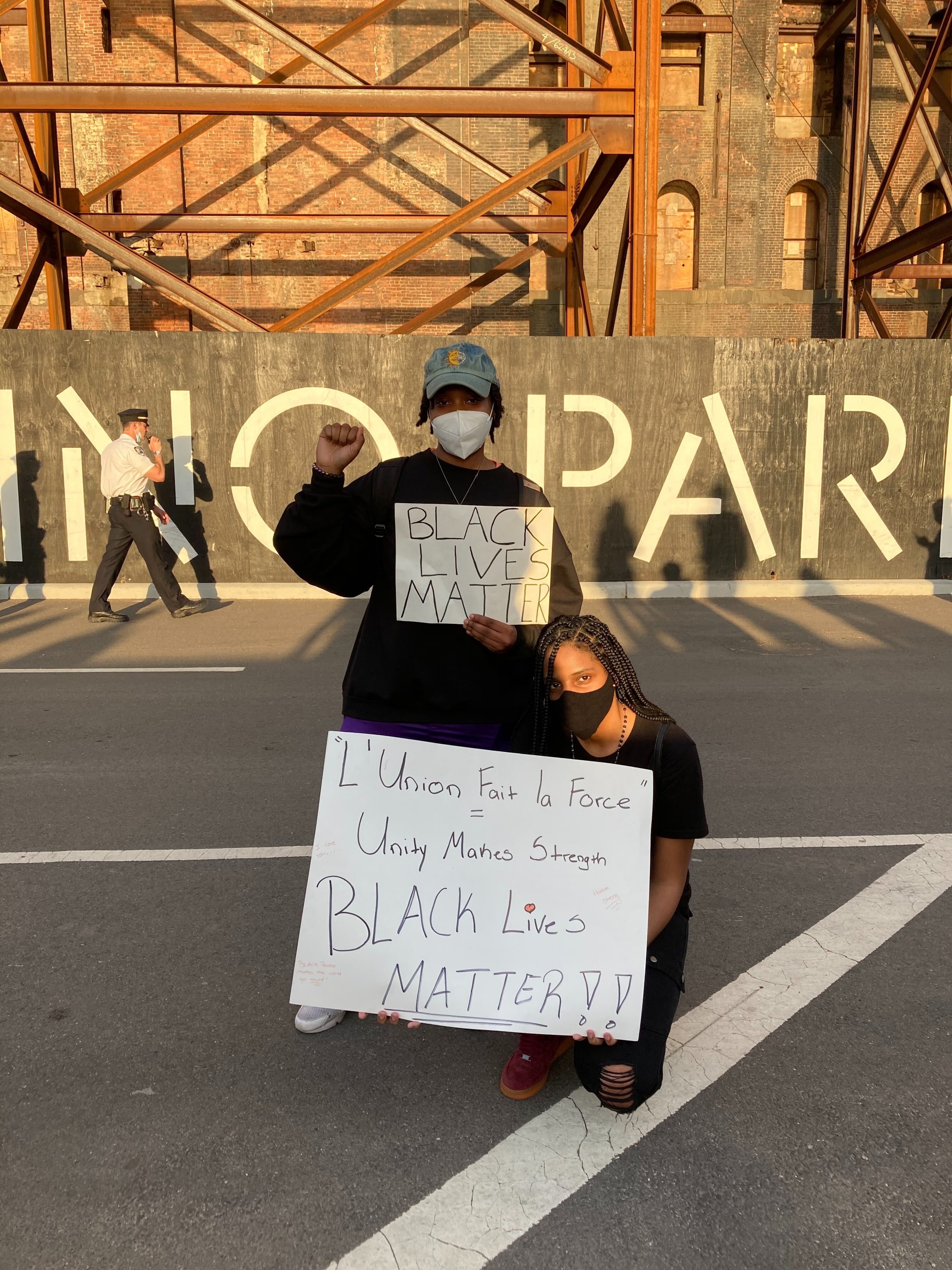
Others joined specifically to honor Taylor.
“I want to fight for her and fight for all the women that went through the same thing,” Tenneille Johnson, 24, told BuzzFeed News.
Johnson said the fight for racial justice is a woman’s fight.
“I want justice, and I want us to be appreciated — especially women,” she said. “Because we’re the ones that always be put, like [Veira] said, an afterthought. We matter, too. We’re on the front line fighting for Black men, too.”
Tanz, a protester who declined to share their last name, came out “to specifically support Breonna Taylor and support all Black lives: women, men, trans women, trans men.”
Five protesters told BuzzFeed News they were marching in part due to their personal experiences as Black women in America — and the gender and racial discrimination their friends and family have faced.
Charity Belgrave, 22, recalled a traumatizing incident with the NYPD when she was younger.
“Me and my cousin, we were just minding our own business. We got stopped by cops because we fit a description or whatever, and I went to put my MetroCard away, and a bunch of cops had their guns drawn on me,” she told BuzzFeed News.
Belgrave said she never wants to see anyone else go through an experience like that, “especially not my women, my brothers, my sisters — nobody.”
Veira hit on a similar theme. “To those who say Black women have attitudes, that we have tone problems,” she said to the protesters. “Imagine Breonna did not get shot that night and had to go to work the next day after having her door kicked out. What kind of mood should she have been in?”
Taylor’s memory has been present in protests elsewhere in the country. Outside the White House in Washington, DC, on Wednesday night, her name repeatedly rang out in the crowd alongside George Floyd’s.
DC resident Bart Sheard, who carried a "Justice for Breonna" sign to the protest, said in recent days he's seen a surge in people wanting to learn more about the victims of police violence.
"It took a little bit longer for people to learn about Breonna's story,” he said, adding that Floyd’s death has galvanized people to rise up. "We're keeping their voices alive and representing them. The four police that were involved with the murder of George Floyd have been arrested, and we have to make sure that the people who killed Breonna Taylor are brought to justice as well."
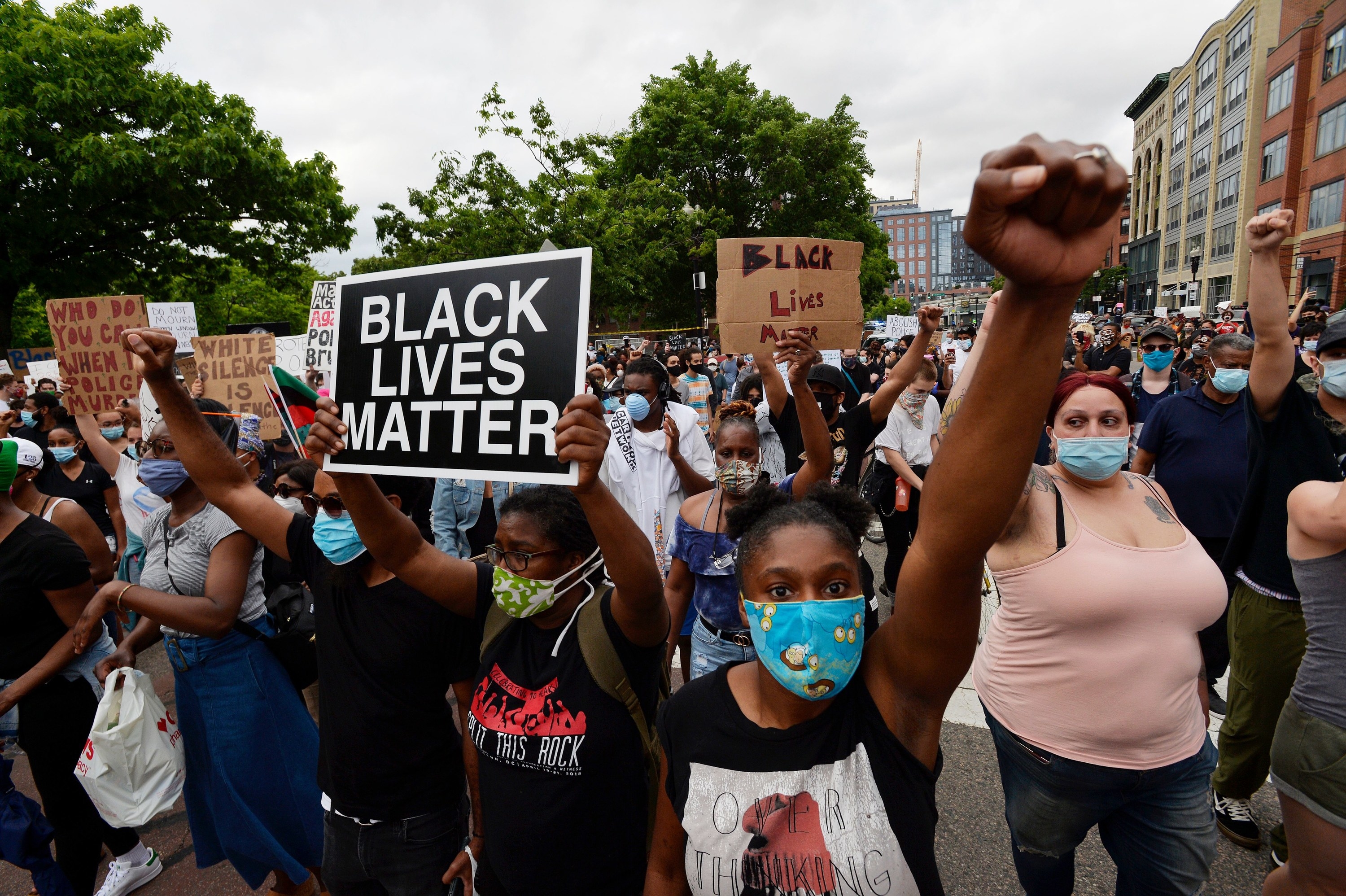
In San Francisco, a crowd of more than 10,000 people gathered in the city’s Mission District on Wednesday. Some carried signs with Taylor’s name, others chanted it.
“Say his name! George Floyd. Say her name! Breonna Taylor,” the crowd said in unison as they traversed Market Street, San Francisco’s main thoroughfare, past a mural of former city supervisor and civil rights leader Harvey Milk.
Police kept their distance and protesters were allowed to voice themselves long after an 8 p.m. curfew. People with signs paid homage to Floyd and other Black citizens who were killed. There were remembrances for Arbery and Oscar Grant, the 22-year-old man who was killed in 2009 at an Oakland train station by a police officer. At San Francisco's Hall of Justice, one of the protest’s end points, the crowd even sang the name of Emmett Till, whose 1955 lynching in Mississippi became a foundation for the US civil rights movement of the 1960s.
In Brooklyn, Veira kept leading the crowd back to two poignant chants.
“How many shots?” She asked over the megaphone.
“Eight shots,” the crowd responded.
“Say her name,” she said. The crowd complied.
“Where are my men? Say her name,” Veira asked. The collective voice of the crowd audibly deepened.
“Breonna Taylor.”
Veira says she’s never organized anything before in her life. She is a makeup artist with a significant following on Instagram. She and many of her friends in the styling and makeup industry haven’t been able to work during the pandemic. Instead, they have been sitting in their homes, watching videos of Black people being harassed and killed by the police, reading articles, and getting more and more outraged. Veira decided it was time for her to do something.
“Join me on Wednesday June 3rd for a peaceful yet impactful protest in solidarity calling for justice for Breonna Taylor and her family. This week would of been Breonna’s birthday and she would of been 27 years old,” Veira wrote to her 10,900 followers on May 30. “Many times when women of color are murdered and abused by police we don’t see the same outrage. Our voices need to be just as loud when they kill innocent Black women. Let us use our voices and demonstration so that those three officers are held accountable, terminated and charged for the murder of Breonna.”
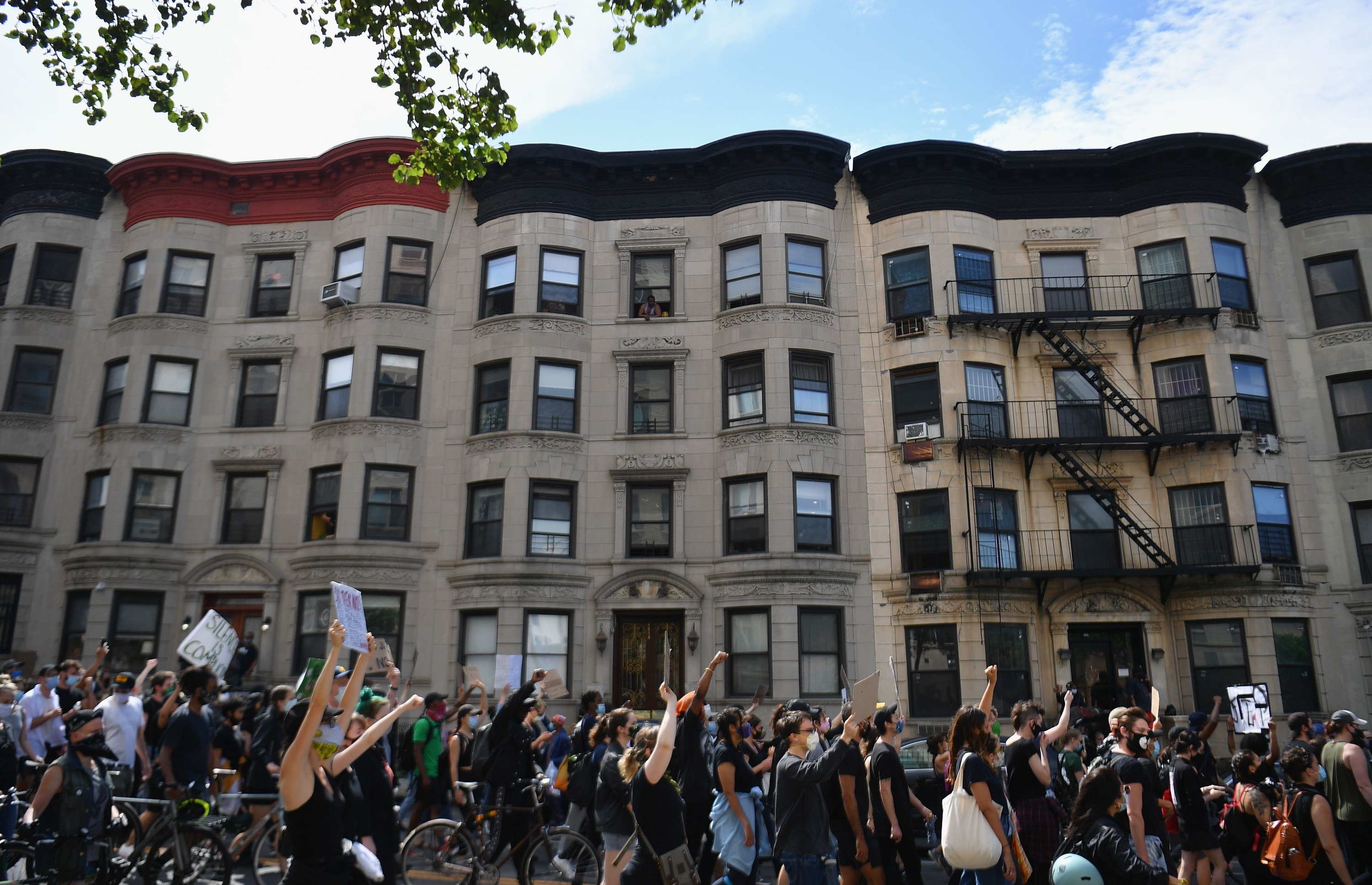
Veira got some help from friends but mostly organized the protest alone. She said she only expected about 50 people; when she got to the starting location, there were already a few hundred people there. As they walked through Brooklyn, passing from historically Black neighborhoods into Hasidic neighborhoods, through gentrified Williamsburg to the waterfront, more and more people joined, stretching about five blocks as neighborhood residents looked on, occasionally yelling their thanks and support. A couple of police cars and a few officers were at the head of the protest, but there was a significant lack of police presence compared to other New York protests that have turned violent in recent days.
At least six of the attendees and co-organizers told BuzzFeed News they understood the anger of the people across the country who have been smashing windows and setting fires, and said they couldn’t judge that anger. But overall they were glad this protest was peaceful.
“If you are upset about something, so angry that you feel like breaking something — and everybody has felt that way — imagine feeling that every single day and unable to do anything about it,” one of three cousins who attended the protest together, but asked to remain anonymous to protect their privacy, told BuzzFeed News.
"This isn't new, either. It happened with Sandra Bland, and it happens with all the women murdered by police in this country," another of the cousins said, referring to the 2015 case of a woman who was jailed for a traffic violation and then found dead in her cell. The death was ruled a suicide, but her family claims she was killed by police. "You only see them second."
Veira said she understands the protests after curfew, the demonstrations that turn violent. But she didn’t want something she organized to go that way. She wanted to show that hundreds of people can make a point without causing destruction. And from beginning to end, it remained peaceful.
She led the protesters to Domino Park in Williamsburg on the East River, next to the old sugar factory where, just before its destruction, artist Kara Walker created a massive installation of sculptures made out of sugar, representing the history of exploitation, murder, and enslavement of Black people in America.
Veira climbed up the bleachers and told the protesters to gather around her, taking over the park. She thanked everyone for leaving their houses, for risking their health during the pandemic for a worthy cause, and for staying peaceful.
“And I say to all of my Black brothers here, speak up for us,” she said to applause and cries of agreement.
“I understand there’s a lot of men that get slaughtered in the street, and they will get their justice,” she continued. “We will make sure they get their justice, but you make sure we get ours.”
Ryan Mac contributed reporting from San Francisco. Paul McLeod contributed reporting from Washington, DC.


